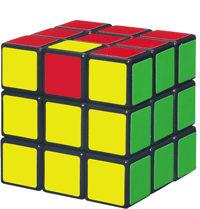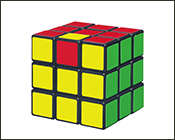
The yoga teacher started off: “Empty your mind. Be simply present. Don’t think of the things you have to do today.”
Right. Guess what I started thinking about.
The power of suggestion can trigger habits, but it can’t stop them. Besides, emptying the mind is a wild goose chase. I tried for years. I lived with people who believed implicitly in it. Questioning it was taboo. There’s no room for exploration in the company of doubtless people, so I left.
Consciousness cannot be empty. Just as we can’t see without seeing something, we’re always conscious of something. Information floods in. We render it all — even our reactive sensations and feelings — into the symbols that make us distinctly human. All is impregnated with the dust of ideas, ordered according to the rules of language and cloaked in the illusion of objective truth. It’s oddly more comforting to believe that the order of the universe is a mystery than that we omnipotently create it. We invent one thing after another with such desperate compulsion that we long to stop. Sadly, the longing too is an invention.
Some things should make us feel angry, afraid or guilty
We crave an impossible sort of self-control. We may even sign up for a meditation course hoping that it will change everything. We are taught that simplicity is our birthright. We have only to let go.
But let go of what — negativity? The pursuit of pure positivity is a fool’s quest. Some things should make us feel angry, afraid or guilty. What binds us to cyclic thinking, repetitive patterns and general torpitude is the vain hope for happiness and simplicity. Spiritual teachers target our desire to be happy; it’s what we all seek, they say. They’re right, but if we expect them to lead us there, that’s our mistake.
Eckhart Tolle is not the first to claim that
history is heading somewhere lovely
Eckhart Tolle artfully blends insights that ring true with predictions that we deeply want to be true. Human consciousness, he tells us, is on the threshold of profound transformation. He wins our trust, then points us toward the great dream.
He’s not the first to claim that history is heading somewhere lovely. The end of days, the second coming, the day of judgement, the final renovation, the completion of the cycle, the end of suffering and the withering away of the state are all variations on this theme. These are the respective destinations of Judaism, Christianity, Islam, Zoroastrianism, Hinduism, Buddhism and Marxism. All portend the end of negativity and the fulfillment of our destiny. There’s a modern version too: according to scientific materialism we’re steadily growing more reasonable.
 Foolish leaders promise an end to confusion and leverage the human failing of cognitive dissonance. In 1956, psychologist Leon Festinger showed that rather than testing beliefs against facts, humans will enthusiastically reinterpret the facts to fit their needs. If your beliefs are indistinguishable from your hopes, you’re probably doing that.
Foolish leaders promise an end to confusion and leverage the human failing of cognitive dissonance. In 1956, psychologist Leon Festinger showed that rather than testing beliefs against facts, humans will enthusiastically reinterpret the facts to fit their needs. If your beliefs are indistinguishable from your hopes, you’re probably doing that.
Reversing direction is tricky. We can’t stop thinking. We can clarify it, but no matter how straight our thinking, life is anything but. Still, clear perception in an open mind can reveal something of great value: the way we identify with our thoughts.
Ideas that seem important make us feel important. No matter how objective we think we are, we buy into belief systems and rationalizations from mostly subconscious motives. We may have good reasons too, but never in isolation. We forget that ideas are abstract approximations of experience, and that experience is multifaceted, interdependent and contingent. It doesn’t come in bite-sized chunks. It’s everything that happens to us. You can’t pinpoint such a moving target, especially since you’re part of it.
Thought is useful, though much of it is
as superfluous as a cloud of pollen
We resist this insight because it’s destabilizing. If we can’t rely on our own thoughts, what can we rely on? Again, the real question is hidden: why rely on anything? In this moment we are alive; we are conscious. Our need for that to be correct, or happy or simple is a prejudice. To the extent that we recognize this, thought is reinstated as a mere tool. We begin to think with a featherlight touch.
There’s no call to abandon reason. Thought is useful, though much of it is as superfluous as a cloud of pollen. Letting go means accepting nature’s prodigality, both in the world and in the teeming process of consciousness. There’s no stopping it.
Thought is essential, but incidental to experience. Imagining that ideas rise above circumstances to gain value of their own is superstition of the most primitive kind.
Teachers who claim to have emptied their minds or conquered suffering will always be with us. They voice a universal dream of the human race. They are a necessary stepping stone. Take their methods to heart, strive with uncompromising honesty, and you will break though the dream, find your own feet and know that you are competent.
The reality that lies beyond is not simpler. It doesn’t need to be.

Hi Stephen,
Thanks so much for “The Complications of Simplicity” and for reminding us that “thoughts” are a part of the deal (Dharma…not so much the “TEACHINGS” but Dharma in the sense of “What is”). Thinking is only thinking.
Also thanks for your story. Really encouraging.
All the best,
Rick
Hi Rick: I’m glad it resonated. Not sure how we stop trying to guide our destiny with our thoughts, but seeing through them is a start.
Well said.
While thinking is useful at times there is so much un-helpful thinking as well – Separating the useful from the not-useful thinking is what i think (!) i will need to work on until death do us (thinking and “me”) apart.
Thanks Stephen. I know this is a difficult point for some people: the wish for happiness is an obstacle to it. It’s counter-intuitive.
Great article. Thought provoking. Brings to mind the idea that we need to stop ‘doing’ and just ‘be’. We humans over-think everything.
I’m learning to be comfortable in just experiencing this great mystery called life.
“In 1956, psychologist Leon Festinger showed that rather than testing beliefs against facts, humans will enthusiastically reinterpret the facts to fit their needs. If your beliefs are indistinguishable from your hopes, you’re probably doing that”
I’m glad I’m an agnostic. As the great philosopher Graham Chapman, once said:
“There’s really nothing an agnostic can’t do if he really doesn’t know whether he believes in anything or not.”
Today, I believe I’ll work on my mindfulness-or maybe not.
Cute, Neal, but I wouldn’t take cognitive dissonance too lightly. Despite its etymology, agnosticism is still a belief set, and no way of thinking can insulate us from our reflexive response to inconvenient truths. We still have to get into that gap between stimulus and response, to pry it open again and again.
Interesting coincidence. I was just reading Gregory Kramer’s “Insight Dialogue” in which he carries out a very cogent (and very secular) examination of interpersonal hunger in the framework of the Four Truths. So of course he eventually gets to cessation, and while not claiming he’s achieved it, claims it to be possible for our drive to proliferate a socially constructed self to cease. More pandering to our hopes? What say ye about niroda?
Mark: I simply can’t conceive of cessation as a final curtain. How come it escapes the laws of contingency when everything else is stuck with it? I think of it as letting go, something to be cultivated as a habit. We get better at it, but perfect?
In Gotama’s time, it might have been possible to conceive of the Taints as a kind of spiritual pollution that we could cleanse ourselves from. But the libido, the fight-or-flight urges of the sympathetic nervous system, the dopamine receptors that also like all kinds of artificial stimulants, our general aquisitiveness — this is all part of the machinery we’re stuck with. Self-directed neuroplasticity is powerful, but I’m not sure it works on the back brain. Being able to let go of unwanted hungers quickly, respond to others with an open heart, and hold this “self” thing lightly, compassionately and ironically would be enough for me, and sufficient work for a lifetime, IMHO.
Mark: I suspect the guys who hung around the Buddha all those years ago might have seen things not so very differently from you and me, and that it was perhaps the religious types who subsequently “preserved” Buddhism that gave it that mystical spin.
Just a quick thank you to Stephen for your writings. Your honesty means the world to me, at pivotal moment on my path. A deeper awakening, with the most positive of connotations.
Thank you to all of you for your highly intelligent contributions here in the comments. Please keep it up, I personally find it invaluable.
I’m glad it’s helping Ben. Thanks for this feedback.